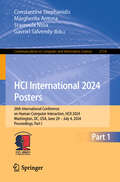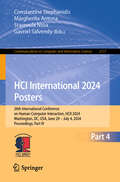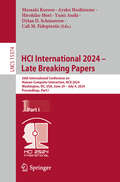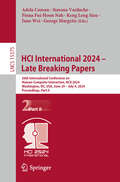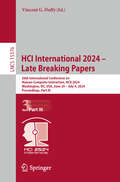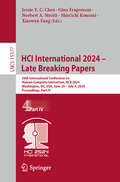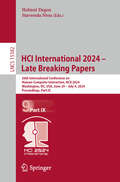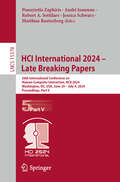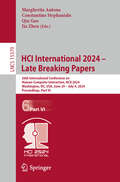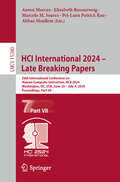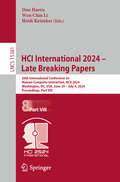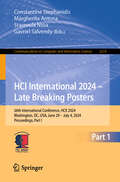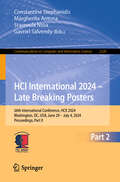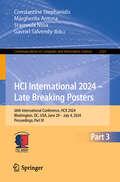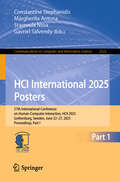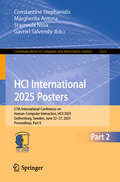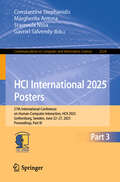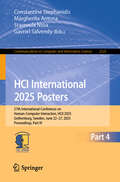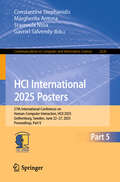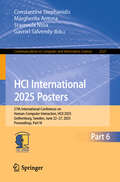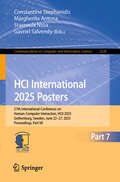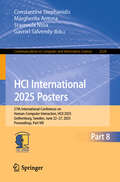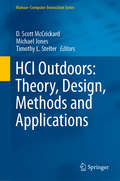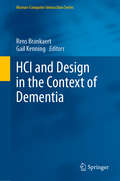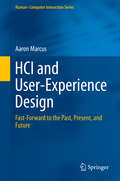- Table View
- List View
HCI International 2024 Posters: 26th International Conference on Human-Computer Interaction, HCII 2024, Washington, DC, USA, June 29–July 4, 2024, Proceedings, Part I (Communications in Computer and Information Science #2114)
by Gavriel Salvendy Margherita Antona Constantine Stephanidis Stavroula NtoaThe seven-volume set CCIS 2114-2120 contains the extended abstracts of the posters presented during the 26th International Conference on Human-Computer Interaction, HCII 2024, held in Washington, DC, USA, during June 29–July 4, 2024. The total of 1271 papers and 309 posters included in the HCII 2024 proceedings were carefully reviewed and selected from 5108 submissions. The posters presented in these seven volumes are organized in the following topical sections: Part I: HCI Design Theories, Methods, Tools and Case Studies; User Experience Evaluation Methods and Case Studies; Emotions in HCI; Human Robot Interaction. Part II: Inclusive Designs and Applications; Aging and Technology. Part III: eXtended Reality and the Metaverse; Interacting with Cultural Heritage, Art and Creativity. Part IV: HCI in Learning and Education; HCI in Games. Part V: HCI in Business and Marketing; HCI in Mobility and Automated Driving; HCI in Psychotherapy and Mental Health. Part VI: Interacting with the Web, Social Media and Digital Services; Interaction in the Museum; HCI in Healthcare. Part VII: AI Algorithms and Tools in HCI; Interacting with Large Language Models and Generative AI; Interacting in Intelligent Environments; HCI in Complex Industrial Environments.
HCI International 2024 Posters: 26th International Conference on Human-Computer Interaction, HCII 2024, Washington, DC, USA, June 29–July 4, 2024, Proceedings, Part IV (Communications in Computer and Information Science #2117)
by Gavriel Salvendy Margherita Antona Constantine Stephanidis Stavroula NtoaThe seven-volume set CCIS 2114-2120 contains the extended abstracts of the posters presented during the 26th International Conference on Human-Computer Interaction, HCII 2024, held in Washington, DC, USA, during June 29–July 4, 2024. The total of 1271 papers and 309 posters included in the HCII 2024 proceedings were carefully reviewed and selected from 5108 submissions. The posters presented in these seven volumes are organized in the following topical sections: Part I: HCI Design Theories, Methods, Tools and Case Studies; User Experience Evaluation Methods and Case Studies; Emotions in HCI; Human Robot Interaction. Part II: Inclusive Designs and Applications; Aging and Technology. Part III: eXtended Reality and the Metaverse; Interacting with Cultural Heritage, Art and Creativity. Part IV: HCI in Learning and Education; HCI in Games. Part V: HCI in Business and Marketing; HCI in Mobility and Automated Driving; HCI in Psychotherapy and Mental Health. Part VI: Interacting with the Web, Social Media and Digital Services; Interaction in the Museum; HCI in Healthcare. Part VII: AI Algorithms and Tools in HCI; Interacting with Large Language Models and Generative AI; Interacting in Intelligent Environments; HCI in Complex Industrial Environments.
HCI International 2024 – Late Breaking Papers: 26th International Conference on Human-Computer Interaction, HCII 2024, Washington, DC, USA, June 29 – July 4, 2024, Proceedings, Part I (Lecture Notes in Computer Science #15374)
by Dylan D. Schmorrow Cali M. Fidopiastis Masaaki Kurosu Ayako Hashizume Hirohiko Mori Yumi AsahiThis nine-volume set LNCS 15473-15482 constitutes the proceedings of the 26th International Conference, HCI International 2023, in Washington, DC, USA, in June/July 2024. For the HCCII 2024 proceedings, a total of 1271 papers and 309 posters was carefully reviewed and selected from 5108 submissions. Additionally, 222 papers and 104 posters are included in the volumes of the proceedings published after the conference, as “Late Breaking Work”. These papers were organized in the following topical sections: HCI Theories, Methods and Tools; Multimodal Interaction; Interacting with Chatbots and Generative AI; Interacting in Social Media; Fintech, Consumer Behavior and the Business Environment; Design for Health and Wellbeing; Ergonomics and Digital Human Modelling; Virtual Experiences in XR and the Metaverse; Playing Experiences; Design for Learning; New Cultural and Tourism Experiences; Accessibility and Design for All; Design for Older Adults; User Experience Design and Evaluation: Novel Approaches and Case Studies; Safety, Security and Privacy; HCI in Automated Vehicles and Automotive; HCI in Aviation, Transport and Safety; Human-Centered AI; AI for Decision Making and Sentiment Analysis.
HCI International 2024 – Late Breaking Papers: 26th International Conference on Human-Computer Interaction, HCII 2024, Washington, DC, USA, June 29 – July 4, 2024, Proceedings, Part II (Lecture Notes in Computer Science #15375)
by Fiona Fui-Hoon Nah June Wei Adela Coman Simona Vasilache George Margetis Keng Leng SiauThis nine-volume set LNCS 15473-15482 constitutes the proceedings of the 26th International Conference, HCI International 2023, in Washington, DC, USA, in June/July 2024. For the HCCII 2024 proceedings, a total of 1271 papers and 309 posters was carefully reviewed and selected from 5108 submissions. Additionally, 222 papers and 104 posters are included in the volumes of the proceedings published after the conference, as “Late Breaking Work”. These papers were organized in the following topical sections: HCI Theories, Methods and Tools; Multimodal Interaction; Interacting with Chatbots and Generative AI; Interacting in Social Media; Fintech, Consumer Behavior and the Business Environment; Design for Health and Wellbeing; Ergonomics and Digital Human Modelling; Virtual Experiences in XR and the Metaverse; Playing Experiences; Design for Learning; New Cultural and Tourism Experiences; Accessibility and Design for All; Design for Older Adults; User Experience Design and Evaluation: Novel Approaches and Case Studies; Safety, Security and Privacy; HCI in Automated Vehicles and Automotive; HCI in Aviation, Transport and Safety; Human-Centered AI; AI for Decision Making and Sentiment Analysis.
HCI International 2024 – Late Breaking Papers: 26th International Conference on Human-Computer Interaction, HCII 2024, Washington, DC, USA, June 29 – July 4, 2024, Proceedings, Part III (Lecture Notes in Computer Science #15376)
by Vincent G. DuffyThis nine-volume set LNCS 15473-15482 constitutes the proceedings of the 26th International Conference, HCI International 2023, in Washington, DC, USA, in June/July 2024. For the HCCII 2024 proceedings, a total of 1271 papers and 309 posters was carefully reviewed and selected from 5108 submissions. Additionally, 222 papers and 104 posters are included in the volumes of the proceedings published after the conference, as “Late Breaking Work”. These papers were organized in the following topical sections: HCI Theories, Methods and Tools; Multimodal Interaction; Interacting with Chatbots and Generative AI; Interacting in Social Media; Fintech, Consumer Behavior and the Business Environment; Design for Health and Wellbeing; Ergonomics and Digital Human Modelling; Virtual Experiences in XR and the Metaverse; Playing Experiences; Design for Learning; New Cultural and Tourism Experiences; Accessibility and Design for All; Design for Older Adults; User Experience Design and Evaluation: Novel Approaches and Case Studies; Safety, Security and Privacy; HCI in Automated Vehicles and Automotive; HCI in Aviation, Transport and Safety; Human-Centered AI; AI for Decision Making and Sentiment Analysis.
HCI International 2024 – Late Breaking Papers: 26th International Conference on Human-Computer Interaction, HCII 2024, Washington, DC, USA, June 29 – July 4, 2024, Proceedings, Part IV (Lecture Notes in Computer Science #15377)
by Gino Fragomeni Jessie Y. C. Chen Xiaowen Fang Norbert A. Streitz Shin'Ichi KonomiThis nine-volume set LNCS 15473-15482 constitutes the proceedings of the 26th International Conference, HCI International 2023, in Washington, DC, USA, in June/July 2024. For the HCCII 2024 proceedings, a total of 1271 papers and 309 posters was carefully reviewed and selected from 5108 submissions. Additionally, 222 papers and 104 posters are included in the volumes of the proceedings published after the conference, as “Late Breaking Work”. These papers were organized in the following topical sections: HCI Theories, Methods and Tools; Multimodal Interaction; Interacting with Chatbots and Generative AI; Interacting in Social Media; Fintech, Consumer Behavior and the Business Environment; Design for Health and Wellbeing; Ergonomics and Digital Human Modelling; Virtual Experiences in XR and the Metaverse; Playing Experiences; Design for Learning; New Cultural and Tourism Experiences; Accessibility and Design for All; Design for Older Adults; User Experience Design and Evaluation: Novel Approaches and Case Studies; Safety, Security and Privacy; HCI in Automated Vehicles and Automotive; HCI in Aviation, Transport and Safety; Human-Centered AI; AI for Decision Making and Sentiment Analysis.
HCI International 2024 – Late Breaking Papers: 26th International Conference on Human-Computer Interaction, HCII 2024, Washington, DC, USA, June 29 – July 4, 2024, Proceedings, Part IX (Lecture Notes in Computer Science #15382)
by Helmut Degen Stavroula NtoaThis nine-volume set LNCS 15473-15482 constitutes the proceedings of the 26th International Conference, HCI International 2023, in Washington, DC, USA, in June/July 2024. For the HCCII 2024 proceedings, a total of 1271 papers and 309 posters was carefully reviewed and selected from 5108 submissions. Additionally, 222 papers and 104 posters are included in the volumes of the proceedings published after the conference, as “Late Breaking Work”. These papers were organized in the following topical sections: HCI Theories, Methods and Tools; Multimodal Interaction; Interacting with Chatbots and Generative AI; Interacting in Social Media; Fintech, Consumer Behavior and the Business Environment; Design for Health and Wellbeing; Ergonomics and Digital Human Modelling; Virtual Experiences in XR and the Metaverse; Playing Experiences; Design for Learning; New Cultural and Tourism Experiences; Accessibility and Design for All; Design for Older Adults; User Experience Design and Evaluation: Novel Approaches and Case Studies; Safety, Security and Privacy; HCI in Automated Vehicles and Automotive; HCI in Aviation, Transport and Safety; Human-Centered AI; AI for Decision Making and Sentiment Analysis.
HCI International 2024 – Late Breaking Papers: 26th International Conference on Human-Computer Interaction, HCII 2024, Washington, DC, USA, June 29 – July 4, 2024, Proceedings, Part V (Lecture Notes in Computer Science #15378)
by Panayiotis Zaphiris Andri Ioannou Matthias Rauterberg Jessica Schwarz Robert A. SottilareThis nine-volume set LNCS 15473-15482 constitutes the proceedings of the 26th International Conference, HCI International 2023, in Washington, DC, USA, in June/July 2024. For the HCCII 2024 proceedings, a total of 1271 papers and 309 posters was carefully reviewed and selected from 5108 submissions. Additionally, 222 papers and 104 posters are included in the volumes of the proceedings published after the conference, as “Late Breaking Work”. These papers were organized in the following topical sections: HCI Theories, Methods and Tools; Multimodal Interaction; Interacting with Chatbots and Generative AI; Interacting in Social Media; Fintech, Consumer Behavior and the Business Environment; Design for Health and Wellbeing; Ergonomics and Digital Human Modelling; Virtual Experiences in XR and the Metaverse; Playing Experiences; Design for Learning; New Cultural and Tourism Experiences; Accessibility and Design for All; Design for Older Adults; User Experience Design and Evaluation: Novel Approaches and Case Studies; Safety, Security and Privacy; HCI in Automated Vehicles and Automotive; HCI in Aviation, Transport and Safety; Human-Centered AI; AI for Decision Making and Sentiment Analysis.
HCI International 2024 – Late Breaking Papers: 26th International Conference on Human-Computer Interaction, HCII 2024, Washington, DC, USA, June 29 – July 4, 2024, Proceedings, Part VI (Lecture Notes in Computer Science #15379)
by Jia Zhou Margherita Antona Constantine Stephanidis Qin GaoThis nine-volume set LNCS 15473-15482 constitutes the proceedings of the 26th International Conference, HCI International 2023, in Washington, DC, USA, in June/July 2024. For the HCCII 2024 proceedings, a total of 1271 papers and 309 posters was carefully reviewed and selected from 5108 submissions. Additionally, 222 papers and 104 posters are included in the volumes of the proceedings published after the conference, as “Late Breaking Work”. These papers were organized in the following topical sections: HCI Theories, Methods and Tools; Multimodal Interaction; Interacting with Chatbots and Generative AI; Interacting in Social Media; Fintech, Consumer Behavior and the Business Environment; Design for Health and Wellbeing; Ergonomics and Digital Human Modelling; Virtual Experiences in XR and the Metaverse; Playing Experiences; Design for Learning; New Cultural and Tourism Experiences; Accessibility and Design for All; Design for Older Adults; User Experience Design and Evaluation: Novel Approaches and Case Studies; Safety, Security and Privacy; HCI in Automated Vehicles and Automotive; HCI in Aviation, Transport and Safety; Human-Centered AI; AI for Decision Making and Sentiment Analysis.
HCI International 2024 – Late Breaking Papers: 26th International Conference on Human-Computer Interaction, HCII 2024, Washington, DC, USA, June 29 – July 4, 2024, Proceedings, Part VII (Lecture Notes in Computer Science #15380)
by Aaron Marcus Pei-Luen Patrick Rau Marcelo M. Soares Abbas Moallem Elizabeth RosenzweigThis nine-volume set LNCS 15473-15482 constitutes the proceedings of the 26th International Conference, HCI International 2023, in Washington, DC, USA, in June/July 2024. For the HCCII 2024 proceedings, a total of 1271 papers and 309 posters was carefully reviewed and selected from 5108 submissions. Additionally, 222 papers and 104 posters are included in the volumes of the proceedings published after the conference, as “Late Breaking Work”. These papers were organized in the following topical sections: HCI Theories, Methods and Tools; Multimodal Interaction; Interacting with Chatbots and Generative AI; Interacting in Social Media; Fintech, Consumer Behavior and the Business Environment; Design for Health and Wellbeing; Ergonomics and Digital Human Modelling; Virtual Experiences in XR and the Metaverse; Playing Experiences; Design for Learning; New Cultural and Tourism Experiences; Accessibility and Design for All; Design for Older Adults; User Experience Design and Evaluation: Novel Approaches and Case Studies; Safety, Security and Privacy; HCI in Automated Vehicles and Automotive; HCI in Aviation, Transport and Safety; Human-Centered AI; AI for Decision Making and Sentiment Analysis.
HCI International 2024 – Late Breaking Papers: 26th International Conference on Human-Computer Interaction, HCII 2024, Washington, DC, USA, June 29 – July 4, 2024, Proceedings, Part VIII (Lecture Notes in Computer Science #15381)
by Don Harris Heidi Krömker Wen-Chin LiThis nine-volume set LNCS 15473-15482 constitutes the proceedings of the 26th International Conference, HCI International 2023, in Washington, DC, USA, in June/July 2024. For the HCCII 2024 proceedings, a total of 1271 papers and 309 posters was carefully reviewed and selected from 5108 submissions. Additionally, 222 papers and 104 posters are included in the volumes of the proceedings published after the conference, as “Late Breaking Work”. These papers were organized in the following topical sections: HCI Theories, Methods and Tools; Multimodal Interaction; Interacting with Chatbots and Generative AI; Interacting in Social Media; Fintech, Consumer Behavior and the Business Environment; Design for Health and Wellbeing; Ergonomics and Digital Human Modelling; Virtual Experiences in XR and the Metaverse; Playing Experiences; Design for Learning; New Cultural and Tourism Experiences; Accessibility and Design for All; Design for Older Adults; User Experience Design and Evaluation: Novel Approaches and Case Studies; Safety, Security and Privacy; HCI in Automated Vehicles and Automotive; HCI in Aviation, Transport and Safety; Human-Centered AI; AI for Decision Making and Sentiment Analysis.
HCI International 2024 – Late Breaking Posters: 26th International Conference, HCII 2024, Washington, DC, USA, June 29 – July 4, 2024, Proceedings, Part I (Communications in Computer and Information Science #2319)
by Gavriel Salvendy Margherita Antona Constantine Stephanidis Stavroula NtoaThe three-volume set CCIS 2319-2321 constitutes the proceedings of the 26th International Conference on Human-Computer Interaction, HCII 2024, held in Washington, DC, USA, during June 29–July 4, 2024. For the HCII 2024 proceedings, a total of 1271 papers and 309 posters was carefully reviewed and selected from 5108 submissions. Additionally, 222 papers and 104 posters are included in the volumes of the proceedings published after the conference, as “Late Breaking Work”. The posters presented in these three volumes are organized in the following topical sections: Part I: User Interface and Interaction Design; Usability and User Experience Evaluation; Innovative Technologies and Human-Centered Solutions. Part II: Innovations in Extended Reality; Smart Systems and Intelligent Design; AI and Design for Human-Centric Applications. Part III: Design for Health and Well-being; Advanced Interactive Technologies for Learning; Gaming, Gamification, and Immersive Design; Technology-Enhanced Experiences in Cultural Heritage.
HCI International 2024 – Late Breaking Posters: 26th International Conference, HCII 2024, Washington, DC, USA, June 29 – July 4, 2024, Proceedings, Part II (Communications in Computer and Information Science #2320)
by Gavriel Salvendy Margherita Antona Constantine Stephanidis Stavroula NtoaThe three-volume set CCIS 2319-2321 constitutes the proceedings of the 26th International Conference on Human-Computer Interaction, HCII 2024, held in Washington, DC, USA, during June 29–July 4, 2024. For the HCII 2024 proceedings, a total of 1271 papers and 309 posters was carefully reviewed and selected from 5108 submissions. Additionally, 222 papers and 104 posters are included in the volumes of the proceedings published after the conference, as “Late Breaking Work”. The posters presented in these three volumes are organized in the following topical sections: Part I: User Interface and Interaction Design; Usability and User Experience Evaluation; Innovative Technologies and Human-Centered Solutions. Part II: Innovations in Extended Reality; Smart Systems and Intelligent Design; AI and Design for Human-Centric Applications. Part III: Design for Health and Well-being; Advanced Interactive Technologies for Learning; Gaming, Gamification, and Immersive Design; Technology-Enhanced Experiences in Cultural Heritage.
HCI International 2024 – Late Breaking Posters: 26th International Conference, HCII 2024, Washington, DC, USA, June 29 – July 4, 2024, Proceedings, Part III (Communications in Computer and Information Science #2321)
by Gavriel Salvendy Margherita Antona Constantine Stephanidis Stavroula NtoaThe three-volume set CCIS 2319-2321 constitutes the proceedings of the 26th International Conference on Human-Computer Interaction, HCII 2024, held in Washington, DC, USA, during June 29–July 4, 2024. For the HCII 2024 proceedings, a total of 1271 papers and 309 posters was carefully reviewed and selected from 5108 submissions. Additionally, 222 papers and 104 posters are included in the volumes of the proceedings published after the conference, as “Late Breaking Work”. The posters presented in these three volumes are organized in the following topical sections: Part I: User Interface and Interaction Design; Usability and User Experience Evaluation; Innovative Technologies and Human-Centered Solutions. Part II: Innovations in Extended Reality; Smart Systems and Intelligent Design; AI and Design for Human-Centric Applications. Part III: Design for Health and Well-being; Advanced Interactive Technologies for Learning; Gaming, Gamification, and Immersive Design; Technology-Enhanced Experiences in Cultural Heritage.
HCI International 2025 Posters: 27th International Conference on Human-Computer Interaction, HCII 2025, Gothenburg, Sweden, June 22–27, 2025, Proceedings, Part I (Communications in Computer and Information Science #2522)
by Gavriel Salvendy Margherita Antona Constantine Stephanidis Stavroula NtoaThe eight-volume set, CCIS 2522-2529, constitutes the extended abstracts of the posters presented during the 27th International Conference on Human-Computer Interaction, HCII 2025, held in Gothenburg, Sweden, during June 22–27, 2025. The total of 1430 papers and 355 posters included in the HCII 2025 proceedings were carefully reviewed and selected from 7972 submissions. The papers presented in these eight volumes are organized in the following topical sections: Part I: Virtual, Tangible and Intangible Interaction; HCI for Health. Part II: Perception, Cognition and Interaction; Communication, Information, Misinformation and Online Behavior; Designing and Understanding Learning and Teaching experiences. Part III: Design for All and Universal Access; Data, Knowledge, Collaboration, Research and Technological Innovation. Part IV: Human-Centered Security and Privacy; Older Adults and Technology; Interacting and driving. Part V: Interactive Technologies for wellbeing; Game Design; Child-Computer Interaction. Part VI: Designing and Understanding XR Cultural Experiences; Designing Sustainable (Smart) Human Environments. Part VII: Design, Creativity and AI; eCommerce, Fintech and Customer Behavior. Part VIII: Interacting with Digital Culture; Interacting with GenAI and LLMs.
HCI International 2025 Posters: 27th International Conference on Human-Computer Interaction, HCII 2025, Gothenburg, Sweden, June 22–27, 2025, Proceedings, Part II (Communications in Computer and Information Science #2523)
by Gavriel Salvendy Margherita Antona Constantine Stephanidis Stavroula NtoaThe eight-volume set, CCIS 2522-2529, constitutes the extended abstracts of the posters presented during the 27th International Conference on Human-Computer Interaction, HCII 2025, held in Gothenburg, Sweden, during June 22–27, 2025. The total of 1430 papers and 355 posters included in the HCII 2025 proceedings were carefully reviewed and selected from 7972 submissions. The papers presented in these eight volumes are organized in the following topical sections: Part I: Virtual, Tangible and Intangible Interaction; HCI for Health. Part II: Perception, Cognition and Interaction; Communication, Information, Misinformation and Online Behavior; Designing and Understanding Learning and Teaching experiences. Part III: Design for All and Universal Access; Data, Knowledge, Collaboration, Research and Technological Innovation. Part IV: Human-Centered Security and Privacy; Older Adults and Technology; Interacting and driving. Part V: Interactive Technologies for wellbeing; Game Design; Child-Computer Interaction. Part VI: Designing and Understanding XR Cultural Experiences; Designing Sustainable (Smart) Human Environments. Part VII: Design, Creativity and AI; eCommerce, Fintech and Customer Behavior. Part VIII: Interacting with Digital Culture; Interacting with GenAI and LLMs.
HCI International 2025 Posters: 27th International Conference on Human-Computer Interaction, HCII 2025, Gothenburg, Sweden, June 22–27, 2025, Proceedings, Part III (Communications in Computer and Information Science #2524)
by Gavriel Salvendy Margherita Antona Constantine Stephanidis Stavroula NtoaThe eight-volume set, CCIS 2522-2529, constitutes the extended abstracts of the posters presented during the 27th International Conference on Human-Computer Interaction, HCII 2025, held in Gothenburg, Sweden, during June 22–27, 2025. The total of 1430 papers and 355 posters included in the HCII 2025 proceedings were carefully reviewed and selected from 7972 submissions. The papers presented in these eight volumes are organized in the following topical sections: Part I: Virtual, Tangible and Intangible Interaction; HCI for Health. Part II: Perception, Cognition and Interaction; Communication, Information, Misinformation and Online Behavior; Designing and Understanding Learning and Teaching experiences. Part III: Design for All and Universal Access; Data, Knowledge, Collaboration, Research and Technological Innovation. Part IV: Human-Centered Security and Privacy; Older Adults and Technology; Interacting and driving. Part V: Interactive Technologies for wellbeing; Game Design; Child-Computer Interaction. Part VI: Designing and Understanding XR Cultural Experiences; Designing Sustainable (Smart) Human Environments. Part VII: Design, Creativity and AI; eCommerce, Fintech and Customer Behavior. Part VIII: Interacting with Digital Culture; Interacting with GenAI and LLMs.
HCI International 2025 Posters: 27th International Conference on Human-Computer Interaction, HCII 2025, Gothenburg, Sweden, June 22–27, 2025, Proceedings, Part IV (Communications in Computer and Information Science #2525)
by Gavriel Salvendy Margherita Antona Constantine Stephanidis Stavroula NtoaThe eight-volume set, CCIS 2522-2529, constitutes the extended abstracts of the posters presented during the 27th International Conference on Human-Computer Interaction, HCII 2025, held in Gothenburg, Sweden, during June 22–27, 2025. The total of 1430 papers and 355 posters included in the HCII 2025 proceedings were carefully reviewed and selected from 7972 submissions. The papers presented in these eight volumes are organized in the following topical sections: Part I: Virtual, Tangible and Intangible Interaction; HCI for Health. Part II: Perception, Cognition and Interaction; Communication, Information, Misinformation and Online Behavior; Designing and Understanding Learning and Teaching experiences. Part III: Design for All and Universal Access; Data, Knowledge, Collaboration, Research and Technological Innovation. Part IV: Human-Centered Security and Privacy; Older Adults and Technology; Interacting and driving. Part V: Interactive Technologies for wellbeing; Game Design; Child-Computer Interaction. Part VI: Designing and Understanding XR Cultural Experiences; Designing Sustainable (Smart) Human Environments. Part VII: Design, Creativity and AI; eCommerce, Fintech and Customer Behavior. Part VIII: Interacting with Digital Culture; Interacting with GenAI and LLMs.
HCI International 2025 Posters: 27th International Conference on Human-Computer Interaction, HCII 2025, Gothenburg, Sweden, June 22–27, 2025, Proceedings, Part V (Communications in Computer and Information Science #2526)
by Gavriel Salvendy Margherita Antona Constantine Stephanidis Stavroula NtoaThe eight-volume set, CCIS 2522-2529, constitutes the extended abstracts of the posters presented during the 27th International Conference on Human-Computer Interaction, HCII 2025, held in Gothenburg, Sweden, during June 22–27, 2025. The total of 1430 papers and 355 posters included in the HCII 2025 proceedings were carefully reviewed and selected from 7972 submissions. The papers presented in these eight volumes are organized in the following topical sections: Part I: Virtual, Tangible and Intangible Interaction; HCI for Health. Part II: Perception, Cognition and Interaction; Communication, Information, Misinformation and Online Behavior; Designing and Understanding Learning and Teaching experiences. Part III: Design for All and Universal Access; Data, Knowledge, Collaboration, Research and Technological Innovation. Part IV: Human-Centered Security and Privacy; Older Adults and Technology; Interacting and driving. Part V: Interactive Technologies for wellbeing; Game Design; Child-Computer Interaction. Part VI: Designing and Understanding XR Cultural Experiences; Designing Sustainable (Smart) Human Environments. Part VII: Design, Creativity and AI; eCommerce, Fintech and Customer Behavior. Part VIII: Interacting with Digital Culture; Interacting with GenAI and LLMs.
HCI International 2025 Posters: 27th International Conference on Human-Computer Interaction, HCII 2025, Gothenburg, Sweden, June 22–27, 2025, Proceedings, Part VI (Communications in Computer and Information Science #2527)
by Gavriel Salvendy Margherita Antona Constantine Stephanidis Stavroula NtoaThe eight-volume set, CCIS 2522-2529, constitutes the extended abstracts of the posters presented during the 27th International Conference on Human-Computer Interaction, HCII 2025, held in Gothenburg, Sweden, during June 22–27, 2025. The total of 1430 papers and 355 posters included in the HCII 2025 proceedings were carefully reviewed and selected from 7972 submissions. The papers presented in these eight volumes are organized in the following topical sections: Part I: Virtual, Tangible and Intangible Interaction; HCI for Health. Part II: Perception, Cognition and Interaction; Communication, Information, Misinformation and Online Behavior; Designing and Understanding Learning and Teaching experiences. Part III: Design for All and Universal Access; Data, Knowledge, Collaboration, Research and Technological Innovation. Part IV: Human-Centered Security and Privacy; Older Adults and Technology; Interacting and driving. Part V: Interactive Technologies for wellbeing; Game Design; Child-Computer Interaction. Part VI: Designing and Understanding XR Cultural Experiences; Designing Sustainable (Smart) Human Environments. Part VII: Design, Creativity and AI; eCommerce, Fintech and Customer Behavior. Part VIII: Interacting with Digital Culture; Interacting with GenAI and LLMs.
HCI International 2025 Posters: 27th International Conference on Human-Computer Interaction, HCII 2025, Gothenburg, Sweden, June 22–27, 2025, Proceedings, Part VII (Communications in Computer and Information Science #2528)
by Gavriel Salvendy Margherita Antona Constantine Stephanidis Stavroula NtoaThe eight-volume set, CCIS 2522-2529, constitutes the extended abstracts of the posters presented during the 27th International Conference on Human-Computer Interaction, HCII 2025, held in Gothenburg, Sweden, during June 22–27, 2025. The total of 1430 papers and 355 posters included in the HCII 2025 proceedings were carefully reviewed and selected from 7972 submissions. The papers presented in these eight volumes are organized in the following topical sections: Part I: Virtual, Tangible and Intangible Interaction; HCI for Health. Part II: Perception, Cognition and Interaction; Communication, Information, Misinformation and Online Behavior; Designing and Understanding Learning and Teaching experiences. Part III: Design for All and Universal Access; Data, Knowledge, Collaboration, Research and Technological Innovation. Part IV: Human-Centered Security and Privacy; Older Adults and Technology; Interacting and driving. Part V: Interactive Technologies for wellbeing; Game Design; Child-Computer Interaction. Part VI: Designing and Understanding XR Cultural Experiences; Designing Sustainable (Smart) Human Environments. Part VII: Design, Creativity and AI; eCommerce, Fintech and Customer Behavior. Part VIII: Interacting with Digital Culture; Interacting with GenAI and LLMs.
HCI International 2025 Posters: 27th International Conference on Human-Computer Interaction, HCII 2025, Gothenburg, Sweden, June 22–27, 2025, Proceedings, Part VIII (Communications in Computer and Information Science #2529)
by Gavriel Salvendy Margherita Antona Constantine Stephanidis Stavroula NtoaThe eight-volume set, CCIS 2522-2529, constitutes the extended abstracts of the posters presented during the 27th International Conference on Human-Computer Interaction, HCII 2025, held in Gothenburg, Sweden, during June 22–27, 2025. The total of 1430 papers and 355 posters included in the HCII 2025 proceedings were carefully reviewed and selected from 7972 submissions. The papers presented in these eight volumes are organized in the following topical sections: Part I: Virtual, Tangible and Intangible Interaction; HCI for Health. Part II: Perception, Cognition and Interaction; Communication, Information, Misinformation and Online Behavior; Designing and Understanding Learning and Teaching experiences. Part III: Design for All and Universal Access; Data, Knowledge, Collaboration, Research and Technological Innovation. Part IV: Human-Centered Security and Privacy; Older Adults and Technology; Interacting and driving. Part V: Interactive Technologies for wellbeing; Game Design; Child-Computer Interaction. Part VI: Designing and Understanding XR Cultural Experiences; Designing Sustainable (Smart) Human Environments. Part VII: Design, Creativity and AI; eCommerce, Fintech and Customer Behavior. Part VIII: Interacting with Digital Culture; Interacting with GenAI and LLMs.
HCI Outdoors: Theory, Design, Methods and Applications (Human–Computer Interaction Series)
by Michael Jones D. Scott McCrickard Timothy L. StelterAdvances in network connectivity, power consumption, and physical size create new possibilities for using interactive computing outdoors. However, moving computing outdoors can drastically change the human outdoor experience. This impact is felt in many kinds of outdoor activities such as citizen science, personal recreation, search and rescue, informal education, and others. It is also felt across outdoor settings that range from remote wilderness to crowded cities. Understanding these effects can lead to ideas, designs and systems that improve, rather than diminish, outdoor experiences. This book represents the current results emerging from recent workshops focused on HCI outdoors and held in conjunction with CHI, GROUP, UbiComp, and MobileHCI conferences. Based on feedback at those workshops, and outreach to other leaders in the field, the chapters collected were crafted to highlight methods and approaches for understanding how technologies such as handhelds, wearables, and installed standalone devices impact individuals, groups, and even communities. These findings frame new ways of thinking about HCI outdoors, explore logistical issues associated with moving computing outdoors, and probe new experiences created by involving computing in outdoor pursuits. Also important are the ways that social media has influenced preparation, experience, and reflection related to outdoor experiences. HCI Outdoors: Theory, Design, Methods and Applications is of interest to HCI researchers, HCI practitioners, and outdoor enthusiasts who want to shape future understanding and current practice related to technology in every kind of outdoor experience.
HCI and Design in the Context of Dementia (Human–Computer Interaction Series)
by Rens Brankaert Gail KenningOld age is currently the greatest risk factor for developing dementia. Since older people make up a larger portion of the population than ever before, the resulting increase in the incidence of dementia presents a major challenge for society. Dementia is complex and multifaceted and impacts not only the person with the diagnosis but also those caring for them and society as a whole. Human-Computer Interaction (HCI) design and development are pivotal in enabling people with dementia to live well and be supported in the communities around them. HCI is increasingly addressing the need for inclusivity and accessibility in the design and development of new technologies, interfaces, systems, services, and tools. Using interdisciplinary approaches HCI engages with the complexities and ‘messiness’ of real-world design spaces to provide novel perspectives and new ways of addressing the challenge of dementia and multi-stakeholder needs. HCI and Design in the Context of Dementia brings together the work of international experts, designers and researchers working across disciplines. It provides methodologies, methods and frameworks, approaches to participatory engagement and case studies showing how technology can impact the lives of people living with dementia and those around them. It includes examples of how to conduct dementia research and design in-context in the field of HCI, ethically and effectively and how these issues transcend the design space of dementia to inform HCI design and technology development more broadly. The book is valuable for and aimed at designers, researchers, scholars and caregivers that work with vulnerable groups like people with dementia, and those directly impacted.
HCI and User-Experience Design
by Aaron MarcusThis book consists of a series of essays which addresses the essentials of the development processes in user-experience design (UX design) planning, research, analysis, evaluation, training and implementation, and deals with the essential components (metaphors, mental models, navigation, and appearance) of user-interfaces and user-experiences during the period of 2002-2007. These essays grew from the authors own column entitled 'Fast Forward' which appeared in Interaction Magazine - the flagship publication of the ACM Special Interest Group on Human-Computing Interaction (SIGCHI). Written in such a way as to ensure longevity, these essays have not been edited or updated, however a short Postscripts has been added to provide some comments on each topic from a current perspective. HCI and User-Experience Design provides a fascinating historical review of the professional and research world of UX and HCI during a period of significant growth and development and would be of interest to students, researchers, and designers who are interested in recent developments within the field.
